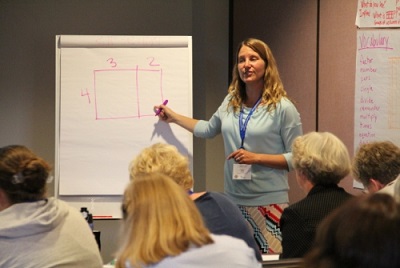- MN ABE Connect
- Archive
- A Perspective on the Flipped Classroom
 September 4, 2015
September 4, 2015
A Perspective on the Flipped Classroom
Amy Vickers, MNI Senior ConsultantThis year at the COABE conference, I attended an interesting LINCS session by Duren Thompson and Beth Ponder about the flipped classroom. It is a topic that has been on my mind; I was interested in hearing the current thinking about adult education and the flipped classroom. I’ll start with the basics for those new to the idea, I’ll then share a surprising take-away that changed my understanding of flipped classrooms.
 When classrooms are “flipped”, it means that rather than learning material in class and being sent home to do practice exercises, students are first asked to learn the material at home, often via online videos. They then return to class the next day after having watched the video as many times as necessary to understand the material, ready to apply what they have learned to an engaging class activity. Some students may grasp the topic right away, while others may need to see or hear it several times. With a flipped classroom, these individual differences are expected. The teacher is then available when the students apply what they have learned, available to answer questions, offer clarification, and correct any misconceptions.
When classrooms are “flipped”, it means that rather than learning material in class and being sent home to do practice exercises, students are first asked to learn the material at home, often via online videos. They then return to class the next day after having watched the video as many times as necessary to understand the material, ready to apply what they have learned to an engaging class activity. Some students may grasp the topic right away, while others may need to see or hear it several times. With a flipped classroom, these individual differences are expected. The teacher is then available when the students apply what they have learned, available to answer questions, offer clarification, and correct any misconceptions.
At www.flippedlearning.org, you can find this definition: “Flipped Learning is a pedagogical approach in which direct instruction moves from the group learning space to the individual learning space, and the resulting group space is transformed into a dynamic, interactive learning environment where the educator guides students as they apply concepts and engage creatively in the subject matter.”
The workshop facilitators shared these four key elements of the flipped approach for adult learners:
- Individualized and customized learning; support for different needs and entry skill levels
- Independent learning skills; increased language exposure, self-discipline, and study skills
- Higher order and critical thinking skills; apply knowledge in context
- Strengthen technology skills, leverage learner interests in technology, mobile 24/7 learning
So many components of the flipped approach seem to fit best practices for adult education. For example, it is student-centered, allows for multiple entry points, and makes time for rigorous classroom activities involving critical thinking. Some questions that I have are:
- How could the learn-at-home information be accessed by all levels of learners?
- Which topics or subject areas work particularly well with the flipped classroom?
- What are some classroom routines that would support the flipped classroom?
- How could students who do not attend every day be supported in the flipped classroom environment?
“Just the simple step of asking learners to learn a few key vocabulary words at home so they can apply them the next day in a classroom activity increases learner motivation and ownership”
In conclusion, the workshop facilitators encouraged us to start small as we try this in our own settings. My surprising takeaway? I had primarily heard of the learn-at-home component happening via online video. These facilitators emphasized that the material could be in any form, even a printed worksheet! Just the simple step of asking learners to learn a few key vocabulary words at home so they can apply them the next day in a classroom activity increases learner motivation and ownership, especially after they see the actual need for knowing the words in the activity that you plan!
Newsletter Signup
Get MN ABE Connect—the official source for ABE events, activities, and resources!
Sign UpArticle Categories
- ABE Foundations/Staff Onboarding
- ACES/Transitions
- Adult Career Pathways
- Assessment
- CCR Standards
- Citizenship
- COVID-19
- Cultural Competency
- Digital Literacy/Northstar
- Disabilities
- Distance Learning/Education
- ELA
- Equity/Inclusion
- ESL
- HSE/Adult Diploma
- Listening
- Math/Numeracy
- Mental Health
- Minnesota ABE
- One-Room Schoolhouse/Multilevel
- Professional Development
- Program Management
- Reading
- Remote Instruction
- Science
- Social Studies
- Speaking/Conversation
- Support Services
- Teaching Strategies
- Technology
- Uncategorized
- Volunteers/Tutors
- Writing